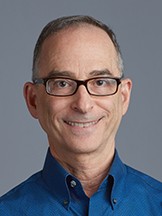While working on his dissertation at the University of Illinois, current NYU professor James Martin felt pressured to hide what he was really interested in: LGTBQ issues.
Now, his research focuses on the mental health disparities in LGBTQ populations and the history of identities within the community, and he is able to reflect on that time in his life.
“I hid that, because in those days, that was the smartest thing to do,” Martin said.
Martin is now the associate dean for Academic Affairs and director of the Master’s of Social Work Program at NYU. He was recently honored by the Caucus of LGBT Faculty and Students in Social Work, an independent organization — that Martin himself founded in 2003 — that serves as a network and advocacy group for social work faculty and doctoral students. Since then, it has expanded to include members from across the globe.
Martin founded this group while he was a member of the Council on Social Work Education, a commission that also focuses on supporting LGBTQ faculty in their work.
“My own personal experience, and many people’s experience, is that if you are a sexual or gender minority in the academic field, you’re often fairly isolated,” Martin said.
When he became the advisor for an LGBTQ group at the Silver School of Social Work in 1998, he noticed that LGBTQ students’ experiences in the workplace did not line up with the progressive New York City that he had initially imagined.
“I couldn’t believe some of the discussions that students were having,” Martin said. “[There were] conversations like, ‘do you think it’s okay to be out where you’re working?’ I was shocked.”
In a statement to WSN, Dean of Silver School of Social Work Neil B. Guterman expressed how valuable Martin’s work in the caucus has been for promoting the mission of Silver as a whole.
“His work with the Caucus of LGBT Faculty and Students, while outside his duties for the school, is in keeping with our mission and our commitment to enhancing the vitality of communities and promoting the ideals of a humane and just world,” Guterman wrote.
In 2011, the caucus established a co-chair position and an executive committee so that Martin could transition out of a leadership role without weakening the organization.
While Martin is now an active member of the social work community, his decision to pursue social work happened due to a chance encounter.
“I didn’t even know what social work [was] back when I was a psychology major,” Martin said. “I was going to pursue a career in all sorts of things, including music.”
After meeting with a friend in his hometown who told more him about the field, Martin decided to pursue a master’s in Social Work at the University of Michigan. He went on to work in a psychiatric hospital and received his doctorate from the University of Illinois at Chicago.
Martin still sees problems with how academic institutions treat LGBTQ faculty and doctoral students. One of these issues is how doctoral students and faculty may not receive funding because people don’t realize how much there is to know about LGBTQ issues.
“I think in places like New York we suffer from people thinking that they’re really progressive or liberal and think that they don’t like to acknowledge that they don’t know as much as they thought.”
Early on in his career, Martin was told that his research was too limited.
“In my last year [teaching at the University of Texas] I had a friend say that ‘some people might think your work is a little narrow,’” Martin said. “That’s the challenge that people have in these areas, because there isn’t an appreciation that these areas are important.”
Despite his initial hesitation while getting his doctorate, Martin chooses to continue to research the topics that he’s passionate about and he cannot imagine dedicating his career to anything else.
“It was my personal experience, and it was my community, so it was what I wanted to do,” Martin said.
In the future, Martin hopes that LGBTQ doctoral students and faculty can use the caucus to receive support that they might not receive from their institution, especially in workplaces where they might feel more isolated.
A version of this article appeared in the Monday, March 11 print edition. Email Mansee Khurana at [email protected].


























































































































































